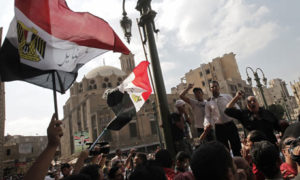
Protesters in Cairo at an October demonstration in support of national unity that led to a clash between pro- and anti-military supporters. Photograph: Mahmud Hams/AFP
Back in mid-February, amid the optimism of the immediate post-Mubarak era, I wrote a blog post exploring the future of philanthropy and the NGO sector in Egypt, noting that the field had been developing quite rapidly despite a restrictive operating environment. I speculated that if regulatory interference from the Ministry of Social Solidarity receded, the future was bright and we might witness major boom in nonprofits and civil society activity. That may still come to pass, but recent developments detailed by IRIN/Guardian Global Development paint a less hopeful picture in the near term:
The first parliamentary elections since Mubarak’s fall are scheduled for 28 November, but NGO leaders say the transitional government led by the Supreme Council of the Armed Forces (SCAF) has mounted a “smear campaign” against them by accusing them of receiving millions of dollars from foreign donors to destabilise the country – going so far as to say the violence on the streets of Cairo during and after the revolution was supported by foreign funding channelled through NGOs. Many of the local organizations being targeted intended to monitor the upcoming elections, but have been prevented from doing so by the electoral commission. SCAF has already banned foreign groups from monitoring the vote.
According to the Guardian, the problems started in June when US ambassador to Egypt Anne Patterson commented that the US had spent $40 million to “promote democracy” since the revolution began, adding that 600 NGOs had already applied for funding. Egyptian Minister of International Cooperation Faiza Abul-Naga subsequently announced that there would be an investigation into foreign funding of unregistered NGOs, and later Justice Minister Mohammed Abdelaziz el-Guind went even further, stating that such organizations might face charges of treason for conspiring against the country by sending sensitive information to foreign parties. Moreover, the accusations appear to be influencing the way ordinary Egyptians view civil society, with activists saying that many people are approaching them with questions about their funding sources:
“This has become a very common question these days,” said Emad Abdel Qawy, the head of the Minya-based Justice and Citizenship Society. “The funny thing is that none of these ordinary citizens had asked about this funding before.” A few days ago, Abdel Qawy narrowly escaped an attack in the southern governorate of Qena by people who called him “traitor” and a “paid agent”.
In July Social Solidarity Minister Gouda Abdel-Khaliq — a Canadian-educated former professor of economics at Cairo University — issued a statement warning civil society associations and NGOs not to apply for foreign grants and calling direct US funding to Egyptian NGOs a violation of Egyptian sovereignty. Going even further, Dr. Khaliq said he had decided to “form a committee to review civil institutions and NGOs and consider tightening legal controls on foreign funding.”
This is exactly the kind of influence many US-based foundations and NGOs did not want to have. Back in April I attended a conference at Philanthropy New York: The Arab World in Transition: What’s the Role of Philanthropy, which featured a panel of speakers including Stephen Heintz, president of the New York City-based Rockefeller Brothers Fund (and a former co-founding president of Demos: A Network for Action & Ideas); Dr. Bassma Kodmani, executive director of the Arab Reform Initiative (and a former senior program officer at the Ford Foundation’s MENA office); and Anthony Richter, associate director at the Open Society Foundations and director of OSF’s MENA initiative and Central Eurasia project. The panelists emphasized that foreign foundations (and any other international funders) needed to play a limited, supporting role and should do nothing to undermine the indigenous nature of the revolution and Egypt’s democratic transition. Given those aspirations, it is particularly discouraging to see the SCAF clamping down on NGOs and denouncing any that work with foreign organizations as traitors.
Still, grassroots groups and community activists may be faring a little better. In September I interviewed Barbara Ibrahim — director of the Gerhart Center for Philanthropy at the American University in Cairo — about the situation and she noted that:
This is a moment of tremendous potential for philanthropy in Egypt. Always a country of great individual generosity, now we are seeing an unleashing of interest in more collective means of problem solving. When the police withdrew from protecting citizens in January, thousands of neighborhood watch groups sprang up spontaneously across the country. Many of those are hoping to evolve into more sustainable community development organizations — the classic motivation for a community foundation. I also anticipate that middle class and professional Egyptians will become more engaged in giving through new institutional forms. Social media like Twitter and Facebook are already being utilized to inform and mobilize citizen funding for good causes.
The situation remains fluid, but many civil society groups are already wondering what happened to the space they thought would open up for them in post-revolutionary Egypt. Hopefully the November parliamentary elections will accelerate reform, but it is clear that the SCAF is in no hurry to fully transfer power, and is not inclined to let NGOs enter the political arena in the meantime.